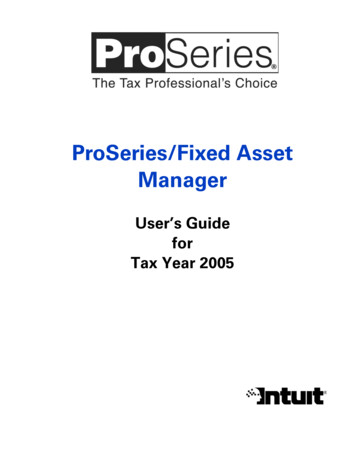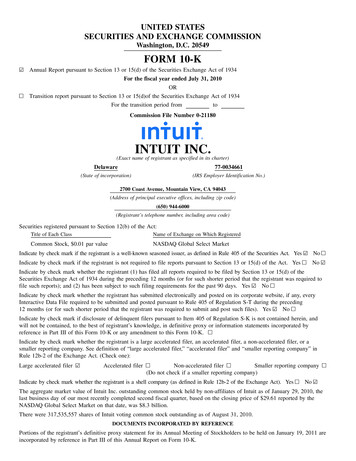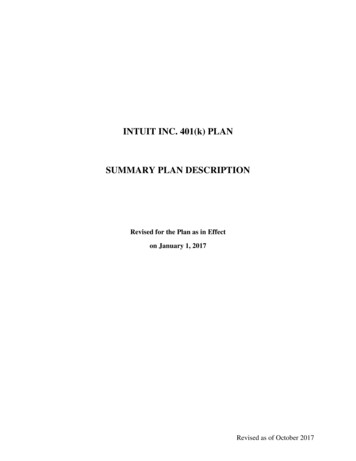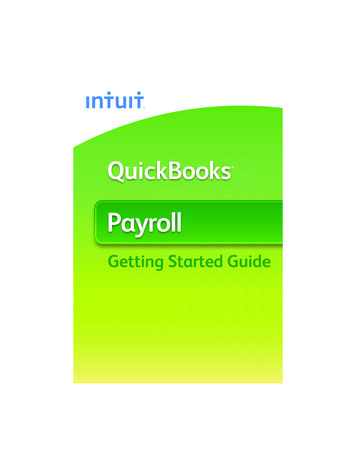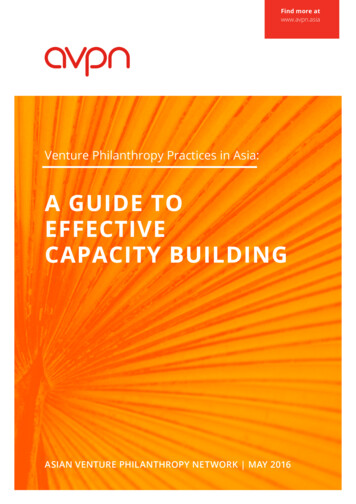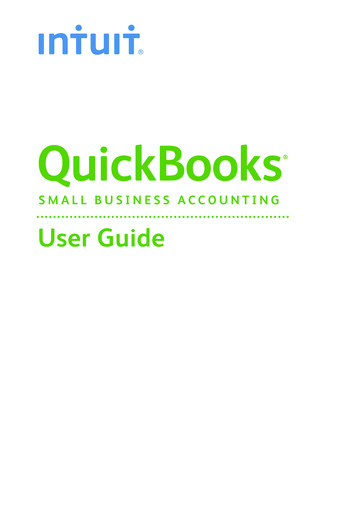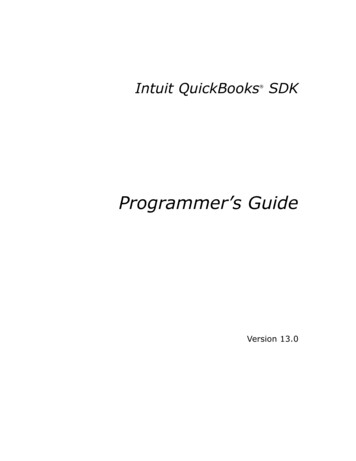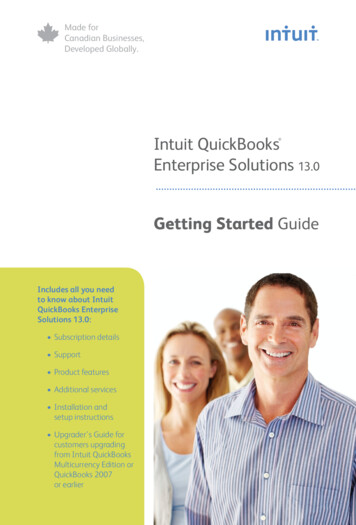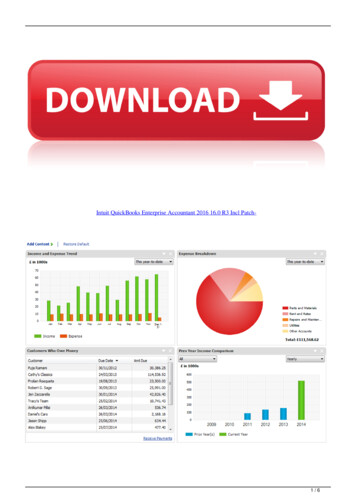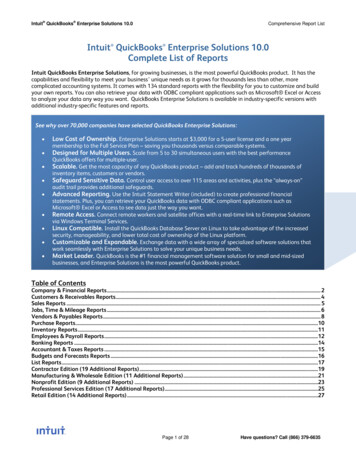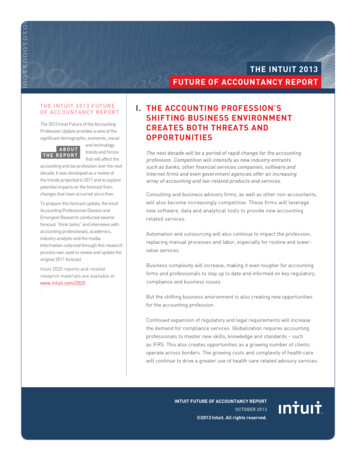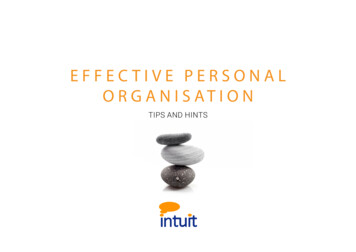
Transcription
EFFECTIVE PERSONALO R G A N I S AT I O NTIPS AND HINTS
WHAT’S ONPART A: ORGANISING YOUSETTING OBJECTIVES - SELFTASK PRIORITISATIONMULTI TASKINGEMAIL MANAGEMENTCALENDAR & APPOINTMENTSRECURRING CALENDAR TASKS EXAMPLESETTING OBJECTIVES - TEAMEFFECTIVE DELEGATION PRACTICESMEETINGSFINAL THOUGHTSTHE BIG DISTRACTORPROCESSAPPENDICES: A TO CTIME MANAGEMENT, PRIORITISATION,PART B: WORKING WITH OTHERSEffective Personal Organisation2www.intuitadvisory.com
INTRODUCTIONThis Effective Personal Organisation Insight contains a variety of tips and hints to help anindividual, particularly those who have responsibility for a team, to get more out of theirworkday.Everyone has just twenty-four hours available each day and at least eight of those shouldbe non-negotiable for sleep. Acknowledging that time and energy are finite resources, it ismission critical to make the most of what is available.Being busy is normal therefore the question we need to ask ourselves is “busy doing what?”. Ihave worked with people that spend an enormous amount of time at work who have achievedamazing outcomes and others who don’t. Working ten hours a day for five hours of worthwhileoutput is a poor value proposition, life is way too short for that! Having strategies, processesand tools to help you zero in on what you need to do and achieve today is vital. Aligning yourworkday plan and actions with your broader life aspirations is no easy task however it isbetter to work at it, than not. Everyone is different so there is no magic solution to cover all,nevertheless you need to have a system that empowers you and fits with your workplace.Acknowledging organisational constraints having an open mind and being prepared to learn,experiment, refine, repeat is the attitude and actions of a winner, progress and improvement isbound to follow.Arthur KirkManaging Director Intuit AdvisoryPlease contact me if you would like to discuss how I can support your people and help youE: arthur@intuitadvisory.comevolve your practice.M: 0427 712 700W: www.intuitadvisory.comEffective Personal Organisation3www.intuitadvisory.com
P A R TAORGANISING YOUEffective Personal Organisation4www.intuitadvisory.com
SETTING OBJECTIVES - SELFTo set objectives you need to analyse what you are currently doing andWhen you address these three questions, it quickly becomes clear whatwhat you should be doing. How many times during the day do you tellsteps can be taken to better organise work. The three key words toyourself you should be working on the other piece of work instead of whatconsider are:you are trying to get finished?You may be efficient and the work you do is accurate, but you are noteffective because by your own admission you should be working on otherthings.To set objectives you need to consider the most basic issues of timeEliminatemanagement. DelegateConcentrateAre you doing tasks that must be completed by you?You need to ask yourself every day what to eliminate and what to delegateAre you or your team members doing non-essential work?and what is left is the work you should concentrate on doing. You will beShould you delegate some of the tasks you are currently completingmore effective doing the right things and more efficient because you now(if a manager) or can you shift tasks of team members to make theirhave more time to do the essential tasks efficiently.desk more efficient and effective?Effective Personal Organisation5www.intuitadvisory.com
TASK PRIORITISATIONTo start - use the urgent & important tool to help get yourtasks sorted into logical time periods. For example, today,tomorrow, this week & next weekUrgent is something that requires immediate attention: CrisesPressing problemsDeadline driven tasksNot urgent,not importantUrgent &importantUrgent,but not importantImportant,but not urgentImportant is something that will contribute to results: Getting the job doneAssisting to complete the jobHelping to achieve the goal (team, project)Effective Personal Organisation6www.intuitadvisory.com
TASK PRIORITISATIONOnce your objectives are clear and you have established a base order forwhere things fit, here are six tried and tested practices for managing andprioritising tasks. Keep tasks detailed and granularRe-prioritize each morning & prepare for the next day refer followingpage for prioritisation process Task visibility is today, tomorrow, this week & next weekDue and to-do dates are not the sameSet yourself remindersFinish one task, create the nextProcrastination is not the root problem, it’s just one of themore prominent symptoms. The cause is lack of focus, it isa basic building block towards any success. Ensure that youhave a system that empowers you and no matter what Eatthe Frog, Every Day!Effective Personal Organisation7www.intuitadvisory.com
MULTI-TASKINGDEBUNKIf you think you are an efficient multi-tasker you may wish to reconsider.Myth Busters1Multi-taskers are the people most easily distracted, regardless of gender ANDinterrupted workers take 23 minutes, on average, to return to productive work!2If you attempt 2 tasks at the same time, it will take you 50% longer than if you didthem one after the other!3Researchers have not been able to find any benefits from multi-tasking – none,zip, zilch, nada!4If you attempt to do 2 number things at the same time you will make twice thenumber of errors (triple error rate for words)!5If you have just solved a problem, unless you rest or eat it is harder to solve thenext one than if you did!Accepting that busy is the norm, putting a pause, a gap, a space between all task and activities is beneficial. Just giving your mind and body a chanceto consciously acknowledge that something has just finished and a new task or activity is about to start can make a huge difference. We are trying toget into a good frame of mind as we go from one thing to another. Finish, clear, next.Effective Personal Organisation8www.intuitadvisory.com
EMAIL MANAGEMENTBasic guidelines for work email management are as follows: Use emails primarily to relay factual and valuable informationit is read to avoid wasting time later locatingAvoid using emails to discussthe email againimportant matters, that should be face to face, video or telephone Electronically label or file the email at the timeAvoid using email to express opinionsFile attachments in accordance with firmcentral locations where multiple people canface to face, video or telephoneaccessClearly label subject linesKeep emails concise, well organized Turn off email notification settingsUse Outlook Rules to automate actions for apredetermined criteria (e.g. all cc emails to aEstablish a time/s each day to reviewdesignated folder) Avoid being placed on non-essential groupemail lists – unsubscribe, unsubscribe!! Delete “delete” box on a regular basis (i.e.weekly)and written with real contentand respond to emailsDo not use your work email address forpersonal mattersTake advantage of software features such asor feelings, again that should be doneDo not let unread emails back up so that youare confronted with dozens of emails at a time protocols at time of first opening Never use Outlook as a filing toolSet and use KPI’s for maximum emailnumbers (i.e. inbox – read, unread)Use sub folders to allocate emails from inboxWhat if emails only came fromthe mail server to your inbox atset times like 8.30am, 11.00am,2.00pm and 4.30pm?Effective Personal Organisation9www.intuitadvisory.com
CALENDAR &APPOINTMENTSProactively managing your calendar & appointments consistent with your key objectives and prioritiesis mission critical. Too often I hear excuses like “people book-in meetings and appointments thatmucks everything up”. Of course these people are not the problem - if your priorities are beingcompromised, you are regularly interrupted or distracted, acknowledge your part and get it sorted! Take control – use your calendar as a shieldPermanently block out time for recurring tasks and activitiesUnderstand your patterns, energy levels – i.e. mornings best for this, afternoons something elseGive days a theme – e.g. Monday’s: planning, organising, liaising, trouble shooting, Wednesdays:queries, reviews Fridays: client & team admin Create gaps – do not book back to back meetings, commitmentsMake it absolutely clear when your are and are not available – “not available” means no calls,interruptions! Do not give others access to change your calendar without clear instruction on what they can andcan not do.Refer following Recurring Calendar Tasks Example“My door is always open” . “You can contact me any anytime”Whilst statements such as these are admirable, just keep in mind that it is falsethinking to try and apply them in all instances at all times.Effective Personal Organisation10www.intuitadvisory.com
RECURRING CALENDAR TASKS EXAMPLEMondayTuesdayTeam workflow meetingWednesdayThursdayFridayJob reviewsJob reviewsWIP & FeesJob ReviewsJob reviewsWIP & :00CallsCallsCallsCallsCalls5:00Update task listUpdate task listUpdate task listUpdate task listUpdate task list11:002:006:00Effective Personal Organisation11www.intuitadvisory.com
RECURRING CALENDAR TASKS EXAMPLEWhenever the question is asked “whatnon-technical training would you mostBehaviourbenefit from” time management invariablymakes the top 3.We are all creatures of habit, good, badand indifferent and unbelievably no one isperfect!If you are keen to improve your perfor-RatingIf a low rating, is this a1 - Big issueproblem that needs to be10 - Non issueimproved? Yes or NoFailing to keep a to-do-listNot setting personal goalsNot prioritizingmance try this self-assessment exercise asFailing to managean easy way to identify a few areas wheredistractionsan effort to improve would be beneficial.Even better, ask your direct report and aProcrastinationsteam member to assess you are well, nothing like a bit of independent feedback.Once you have completed the exercise usea simple action plan (refer following page)to get organised and underway.Taking on too muchThriving on ‘busy’MultitaskingNot taking breaksInnefectively schedulingtasksEffective Personal Organisation12www.intuitadvisory.com
RECURRING CALENDAR TASKS EXAMPLEFrom the self assessment exercise on the previous page, determine your top 3 time killers and make a start on planning on how you could makeimprovements.Given that you will either be trying to break an old habit or create a new habit it is important to just work on say, 1 to 3, at any point in time. In the firstinstance you are looking for the low hanging fruit, things that are not all that hard to change that will bring noticeable improvement to an Organisationpretty much from the get go.What am I going to change?Effective Personal OrganisationHow will I do this?When will it be done by?13How will I make myselfaccountable for this?www.intuitadvisory.com
P A R TBWORKING WITH OTHERSEffective Personal Organisation14www.intuitadvisory.com
SETTING OBJECTIVES - TEAMEffective personal organisation at a managerial level, must include motivating others to organise their desks also. The more efficient and effective staffare, the more efficient the manager’s desk will be also. At that point work flowing upward is being assessed it is then time to be effective. Constantfeedback is important. Every day you must ask yourself if completing a particular task enhances the efforts of the team to meet organisational goals.Anyone who works at a desk should be effective first in order to insure he or she only works on essential tasks and then efficiently complete those tasks.Doing this requires:IdentifyingChanging orProviding regularLooking for waysDeveloping personalMaintaining skillpersonal strengthseliminating badfeedback to yourself andto streamlinegoals and objectiveslevelsand weaknesseshabitsyour supervisor as to youressentials tasksthat are measurable anduse of time completingachievableparticular tasksDefining the difference between effective and efficient only takes a few words but they are loaded with important concepts.Efficient – doing things right (know your stuff!)Effective – doing the right things (eat the frog!)Effective Personal Organisation15www.intuitadvisory.com
EFFECTIVE DELEGATIONPRACTICESSuccessful delegation has its own logic and requirements and no matter what, begin with the end in mind! It starts with you, be absolutely clear on your role and objectives - ifyou are in a manager role it is your responsibility to delegate.to complete the task, how much time to research answers, when to referInvest, invest, invest in others – time, effort and consistency ofback. approach is vital, it is a long game strategy. Chose wisely – invest in the right people, is it their job to do this work, Start with the end in mind ensuring that the team members understandwhat the final result must be!Effective Personal OrganisationMake sure that processes are clearly documented and understood includinguse of software, tools, checklist and templates.do they have the capacity and capability, do they need training? Communicate the rules – be absolutely clear on how much time is requiredProvide regular and constructive feedbackBe prudent, only delegate tasks, jobs for which it makes sense to do so andnever dump on others!16www.intuitadvisory.com
EFFECTIVEDELEGATIONPRACTICEST H E END GA M EAt first sight, delegation can feel like more hassle than it’sworth, however by delegating effectively, you can hugelyexpand the amount of work that you can deliver.When you arrange the workload so that you are workingon the tasks that have the highest priority for you, andother people are working on meaningful and challengingassignments, you have a recipe for success.To delegate effectively, choose the right tasks to delegate,identify the right people to delegate to, and delegate in theright way. There’s a lot to this, but you’ll achieve so muchmore once you’re delegating effectively!Effective Personal Organisation17www.intuitadvisory.com
MEETINGSFor many, a large segment of the week is tied up in meetings.People seem to naturally want to set up meetings. Meetings can be useful but unfortunately they are often used todelay making a decision or are used as a way to “share the blame” or avoid taking responsibility for a decision thatneeds to be made. Unnecessary meetings are not only time wasters, but they also often create new time-wastingassignments for organisational personnel.Managing meetings effectively requires a range of issues to be well handled: Purpose: Is the meeting essential for achieving organisational goals and does it contribute to efficient andeffective completion of essential job functions? Agenda: Is it clear what will be covered, whether it is an information, discussion or a decision making matter. Howmuch time is available for each item of business? Information: Have attendees been provided with the right information in enough time to prepare for the meeting?Chair: Does the meeting have an impartial chairperson who can keep the meeting purpose and agenda on track?Space: is the venue and other facilities conducive to holding an efficient and effective meeting?Attendees: Are they able to collaborate during the meeting and then able to delegate tasks resulting from thecollaboration? Results: Are outcomes followed-up, implemented and are those responsible held accountable? Is there justifiablebenefit for your job, team, business unit by attending the meeting?Phones must be out of sight and on silent! For short meetings everyone stands up, no chairs!Effective Personal Organisation18www.intuitadvisory.com
P A R TCFINAL THOUGHTSEffective Personal Organisation19www.intuitadvisory.com
THE BIG DISTRACTORFor the best part of 60 years, when an extra unit of time was spent in work, acorresponding unit of productivity was usually achieved. In other words theoutput from the additional time had proportionate value. In the last 15 yearsthat relationship has changed dramatically, in essence we are now doingmore for less.The primary reason for this has been attributed to the smart phonerevolution. The problem is not smart phones as such, it is how we are usingthem and unless employers and employees work with sensible guidelinesand policies they will continue to be a productivity detractor. In many placessmart phones are now a top 5 W & H.S risk! At work personal phones shouldbe out of sight, turned off or at least on silent.Time & ProductivitymeTiodPr1950Effective Personal ry.com
PROCESSThe principles and ideas covered in this Insight have been widely used for many years and are still relevant in today’s world.What has changed is the plethora of digital applications that have been designed to help assist with organisational management. In recent times digitalapps such as Evernote, OneNote, Todoist, Things 3, Trello, Asana, Dropbox, Google Docs, MS 360 amongst others, have been developed to help solve thisperennial challenge.The use of Artificial Intelligence, Robotic Process Automation, Enterprise Resource Planning, Customer Relationship Management will increasingly driveworkflow automation and in doing so should support human efficiency and effectiveness. Task alerts and reminders, by way of example, are just the start ofwhat we will see.Regardless of all things digital, we must make the most of what is provided in our workplace. Wherever possible we should leverage the availabletechnology and minimize the number of tools and processes. If the holy grail of a one stop solution is not available, it is vital to look for the most simple andintegrated approach available. Please avoid the trap of having a range of information that you are constantly updating and transferring from source one tothe other – this is an efficiency and effectiveness killer!For example, if Microsoft 360 is being used in your workplace for email and calendar, consider maximizing the full suite (i.e., Tasks, OneNote, Teams).Additionally, it is also critical to be able to access your data across all devices in play – desktops, laptops, tablets, servers, mobile telephones,smartphones, smart watches.Refer also to Intuit’s e-book entitled Innovation Is Everyone’s Job.Key Take-OutsSet Objectives. Regular Planning. Integrated Tools. Take Responsibility. Be Disciplined.Effective Personal Organisation21www.intuitadvisory.com
APPENDIXEffective Personal Organisation22www.intuitadvisory.com
A P P E N D I XATIME MANAGEMENT MISTAKESThe following represents ten of the most common time management mistakes, as well as identifying strategies and tips that you can use to overcomethem.M I S T AK E #1 . F A I L I N G TO K E E P A TO- DO LISTDo you ever have that nagging feeling that you’ve forgotten to do an important piece of work? If so, you probably don’t use a To-Do List to keep on top ofthings. (Or, if you do, you might not be using it effectively!)The trick with using To-Do Lists effectively lies in prioritizing the tasks on your list. Many people use an A – F coding system (A for high priority items, F forvery low priorities). Alternatively, you can simplify this by using A through D, or by using numbers.M I S T AK E #2 . N O T S E T TING P E RSONAL GOALSAre you clear on what do need to achieve this week, months, six months? What about this time next year, or even 10 years from now?Personal goal setting is essential to managing your time well, because goals give you a destination and vision to work toward. When you know where youwant to go, you can manage your priorities, time, and resources to get there. Goals also help you decide what’s worth spending your time on, and what isjust a distraction.M I S T AK E #3 . N O T P R IORITIZINGYour assistant has just walked in with a crisis that she needs you to deal with right now, but you’re in the middle of brainstorming ideas for a new client.You’re sure that you’ve almost come up with a brilliant idea for their marketing campaign, but now you risk losing the thread of your thinking because ofthis ‘emergency.’Effective Personal Organisation23www.intuitadvisory.com
A P P E N D I XATIME MANAGEMENT MISTAKESM I S T AK E #4 . F A I L I N G TO MANAGE DISTRACTIONSDo you know that some of us can lose as much as two hours a day to distractions? Think how much you could get done if you had that time back!Whether they come from emails, IM chats, colleagues in a crisis, or phone calls from clients, distractions prevent us from achieving flow , which is thesatisfying and seemingly effortless work that we do when we’re 100 percent engaged in a task.M I S T AK E #5 . P R O C RA STINATIONProcrastination occurs when you put off tasks that you should be focusing on right now. When you procrastinate, you feel guilty that you haven’t started;you come to dread doing the task; and, eventually, everything catches up with you when you fail to complete the work on time.M I S T AK E #6 . T A K I N G O N TOO MUCHAre you a person who has a hard time saying ‘no’ to people? If so, you probably have far too many projects and commitments on your plate. This can leadto poor performance, stress, and low morale.Or, you might be a micromanager : someone who insists on controlling or doing all of the work themselves, because they can’t trust anyone else to do itcorrectly. (This can be a problem for everyone – not just managers!)M I S T AK E #7 . T H RIV IN G ON ‘BUSY ’Some people get a rush from being busy. The narrowly-met deadlines, the endless emails, the piles of files needing attention on the desk, the frantic race tothe meeting. What an adrenaline buzz! The problem is that an ‘addiction to busyness’ rarely means that you’re effective, and it can lead to stress. Instead,try to slow down, and learn to manage your time better.Effective Personal Organisation24www.intuitadvisory.com
A P P E N D I XATIME MANAGEMENT MISTAKESM I S T AK E #8 . M U L T IT A SK INGTo get on top of her workload, Jackie regularly writes emails while she chats on the phone to her clients. However, while Linda thinks that this is a gooduse of her time, the truth is that it can take 20-40 percent more time to finish a list of jobs when you multitask, compared with completing the samelist of tasks in sequence. The result is also that she does both tasks poorly – her emails are full of errors, and her clients are frustrated by her lack ofconcentration. So, the best thing is to forget about multitasking , and, instead, focus on one task at a time. That way, you’ll produce higher quality work.M I S T AK E #9 . N O T T A K I NG BRE AK SIt’s nice to think that you can work for 8-10 hours straight, especially when you’re working to a deadline. But it’s impossible for anyone to focus andproduce really high-quality work without giving their brains some time to rest and recharge.So, don’t dismiss breaks as ‘wasting time.’ They provide valuable down-time, which will enable you to think creatively and work effectively.M I S T AK E #1 0 . I N E F F E CTIVE LY SCH E DULING TASK SAre you a morning person? Or do you find your energy picking up once the sun begins to set in the evening? All of us have different rhythms, that is,different times of day when we feel most productive and energetic.You can make best use of your time by scheduling high-value work during your peak time, and low-energy work (like returning phone calls and checkingemail), during your ‘down’ time.Effective Personal Organisation25www.intuitadvisory.com
A P P E N D I XBPRIORITISATIONA philosophy professor stood before his class with some items on the table in front of him. When the class began, wordlessly he picked up a very large andempty mayonnaise jar and proceeded to fill it with rocks, about 2 inches in diameter.He then asked the students if the jar was full. They agreed that it was.So the professor then picked up a box of pebbles and poured them into the jar. He shook the jar lightly. The pebbles, of course, rolled into the open areasbetween the rocks.He then asked the students again if the jar was full. They agreed it was.The professor picked up a box of sand and poured it into the jar. Of course, the sand filled up the remaining open areas of the jar.He then asked once more if the jar was full. The students responded with a unanimous “Yes.”“Now,” said the professor, “I want you to recognize that this jar represents your life. The rocks are the important things – your family, your partner, yourhealth, your children – things that if everything else was lost and only they remained, your life would still be full. The pebbles are the other things thatmatter – like your job, your house, your car. The sand is everything else, the small stuff.”“If you put the sand into the jar first,” he continued, “there is no room for the pebbles or the rocks. The same goes for your life. If you spend all your time andenergy on the small stuff, you will never have room for the things that are important to you. Pay attention to the things that are critical to your happiness.Play with your children. Take your partner out dancing. There will always be time to go to work, clean the house, give a dinner party, or fix the disposal.”“Take care of the rocks first – the things that really matter. Set your priorities. The rest is just sand.”Effective Personal Organisation26www.intuitadvisory.com
A P P E N D I XCPROCRASTINATION TYPESType:The PerformerThe Self DeprecatorThe Over-BookerThe Novelty SeekerClassic“I work well under pressure”“I am so lazy now”“I’m so busy”“I just had the best idea”Just in time completion with theUsually these people are theAnother day and another fullThe bower bird, shiny objectsunderling issue being perfectionism.opposite of lazy and are too hard oncalendar - often the busiest peoplesyndrome. They are constantlyIf you are tight on time there isthemselves. They get over-tired, areget the most done. However therecoming up with new projects, getno way it can be done to yourstubborn and don’t ask for help.Line:Key Traits:Biggestare those that use busyness as anbored, move on to the next greatunreasonably high standards!excuse for not getting things done,thing. They love the latest trends andCan also just be a bad habit.usually a sign of avoidance.“what everyone else” is doing.Taking a break, normally assumingCreating distraction and chaos toCompletion.the position “I don’t have time for aavoid facing what needs to be donerest right now”.right now.Getting started.Challenge:Fatigue, burn-out.SomeSet start dates, keep tasks detailedRecharge using pause techniquesTake a moment of introspection.Put robust research, scoping,Solutions:and granular, re-prioritize eachbetween tasks, mini breaks duringAsk yourself questions like: “whatplanning, prioritising, decisionmorning & prepare for the next day.the day (stretch, walk), plan and takeam I busy doing”, “what am I reallymaking and accountability aroundregular holidays (extra long weekend,avoiding?, what am I afraid of?”them.Make task visibility today, tomorrow,1 week, annual vacation mix).this week & next week understandingAllow yourself to have space toWhen planning your day put the mustUnable to move to the next ‘thing”that due and to-do dates are not therebuild energy as a daily practice.do’s at the start and get them out ofuntil the current project is completed.same.Practice saying NO appropriately,the way, this is referred to as eatingeven if it is “I can, but not right now”.the frog!Set yourself reminders, finishingone task, then create move on to thenext.Effective Personal Organisation27www.intuitadvisory.com
S t r a t e gy . M ome n t u m. R e s u l ts.Effective Personal Organisation28www.intuitadvisory.com
Effective personal organisation at a managerial level, must include motivating others to organise their desks also. The more efficient and effective staff are, the more efficient the manager's desk will be also. At that point work flowing upward is being assessed it is then time to be effective. Constant Effective
